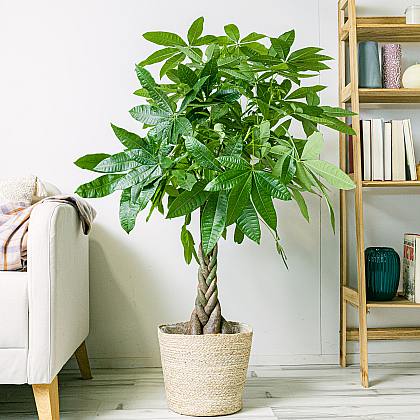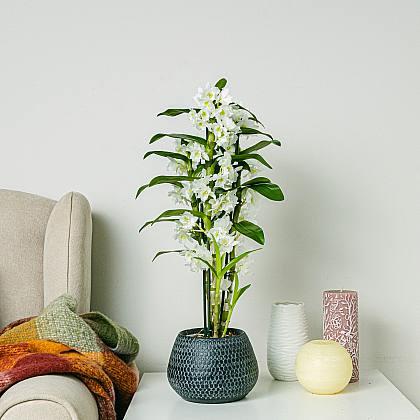Discover the myths and facts about orchid care
Discover the myths and facts about orchid care and enter a world full of beauty and mystery. Have you ever thought about having an orchid at home but backed out...
Discover the myths and facts about orchid care and enter a world full of beauty and mystery. Have you ever thought about having an orchid at home but backed out because you think they are difficult to care for? Do not worry! In this article, we'll tell you the truth behind this myth and give you practical tips to keep your orchids healthy and flourishing. In addition, we will debunk some popular beliefs about the ideal substrate, the importance of light and temperature, and whether it is really necessary to fertilize them. So get ready to delve into the fascinating world of orchids and find out everything you need to know to care for them like an expert. Let's get started!
Orchids: Beauty and Mystery in a Plant
Orchids are one of the most fascinating plants out there. Its exotic and mysterious beauty has captivated nature lovers for centuries. With their unique shapes and vibrant colors, these flowers are true living gems. But beyond their appearance, orchids also hide a mystery in their care. It is often said that they are difficult to care for, but is this really true? Uncovering the truth behind this claim will allow us to enjoy these natural wonders even more. Orchids require some specific care, but with a little patience and knowledge, anyone can learn how to keep them healthy and flourishing. Their beauty should not intimidate us, but inspire us to investigate and learn more about them. Instead of seeing them as a difficult plant to care for, we should see them as an exciting and rewarding challenge. Orchids are a reminder of the diversity and magic that nature has to offer. They are a treat for our senses and an invitation to immerse ourselves in the natural world around us. So don't be afraid to delve into the fascinating world of orchids and discover for yourself the beauty and mystery that these plants have to offer.
Myth or Fact: Are Orchids Hard to Care For?
Orchids are known for their beauty and mystery, but there is also a belief that they are difficult to care for. Is this a myth or a reality? The truth is, caring for orchids may seem complicated at first, but with a little patience and knowledge, anyone can do it. It's true that these plants have specific needs, such as proper light, controlled temperature, and proper watering. However, once you understand these needs and meet them, you'll see your orchids bloom and thrive. You don't have to be a gardening expert to take care of these beautiful plants. You just need to give them time and attention. In addition, there are numerous online resources and books that will guide you in caring for orchids. So don't be put off by rumors that they're hard to care for. Give it a try and discover how rewarding it can be to have healthy, blooming orchids in your home!
The Importance of Light and Temperature for Orchids
Light and temperature are key factors for proper orchid care. These beautiful plants need bright but indirect light to thrive. Placing them near an east- or west-facing window is ideal, as they will receive the right amount of sunlight without being damaged by direct rays. However, we must be careful not to expose them to direct sunlight for long periods, as this can burn their delicate leaves. In addition, orchids require a change in temperature between day and night to bloom. During the day, the ideal temperature ranges from 20°C to 25°C, while at night it should drop to around 15°C to 18°C. This change in temperature allows them to develop healthy buds and flowers. It is important to remember that each species of orchid has its own specific light and temperature needs, so it is advisable to research the ideal conditions for each type before purchasing them. Providing them with the right environment in terms of light and temperature will not only ensure their healthy growth, but also allow us to fully enjoy their beauty and mystery.
Proper Watering: How Much Water Do Orchids Really Need?
Orchids are plants that arouse admiration for their beauty and mystery. However, they are often thought to be difficult to care for, which is not always true. One of the most important aspects of orchid care is proper watering. There is a belief that these plants need large amounts of water to survive, but in reality, they require more moderate watering. Overwatering can be harmful to orchids, as their roots are sensitive to waterlogging. Therefore, it is advisable to water them every 7-10 days, depending on the type of orchid and the climate. It is important to observe the substrate before watering again: if it is wet, it is better to wait a little longer. In addition, it is preferable to use water at room temperature and avoid wetting the leaves and flowers, as this can promote the appearance of diseases. When watering, it is advisable to do it evenly and without waterlogging the substrate. In summary, to keep our orchids healthy, we must keep in mind that they do not need large amounts of water, but moderate and controlled watering. This way we can enjoy its beauty for a long time.
The ideal substrate for orchids: debunking popular beliefs
Sometimes, taking care of our orchids can prove to be a challenge. One of the aspects that generates the most doubts is the ideal substrate for these beautiful plants. There are many popular beliefs about this, but what is the truth in them? Let's debunk some myths! First, we need to say goodbye to the idea that orchids need soil to grow. Orchids are actually epiphytes, meaning they attach themselves to trees and rocks in nature. Therefore, the ideal substrate for them is not soil, but an aerated and draining medium. A mix of pine bark, sphagnum moss, and perlite can be perfect. Also, it's important to remember that orchid roots need air to breathe, so the substrate needs to allow for good ventilation. Another common myth is that orchids need small pots. The reality is that these plants have long and extensive roots, so they need space to grow and develop properly. So, make sure you choose a pot large enough to accommodate the roots without squeezing them. By following these tips, you'll be providing your orchids with the ideal substrate for healthy, flourishing growth. Don't be afraid to experiment and find the perfect match for your beautiful orchids!
Do orchids need to be fertilized? The Truth Behind the Myth
It is true that orchids are delicate plants and require special care, but is it really necessary to fertilize them? Many myths circulate on this topic, but the truth is that yes, orchids need to be fertilized. However, not just any type of fertilizer is suitable for them. It is important to choose a fertilizer specifically for orchids, as these plants have unique nutritional needs. The fertilizer should contain the necessary nutrients in the right proportions, such as nitrogen, phosphorus, and potassium. In addition, it is advisable to use a liquid fertilizer diluted in water and apply it sparingly, following the manufacturer's instructions. Don't overdo the amount of fertilizer, as this can damage the plant's roots. The frequency of fertilization will depend on the type of orchid and environmental conditions, but it is generally recommended to fertilize every two weeks during the growing season. In short, fertilizing orchids is necessary to provide them with the nutrients they need to grow and bloom properly. By following the proper instructions and using the right fertilizer, you can keep your orchids healthy and beautiful. Don't be afraid of this myth and give your orchids the food they need!
Practical Tips to Keep Your Orchids Healthy and Flourishing
To keep your orchids healthy and flourishing, it's important to follow some practical tips. First, make sure you place them in a place with enough light, but avoid direct sun exposure. Orchids need indirect light to thrive. In addition, it controls the temperature of the environment. These plants prefer warm temperatures during the day and slightly cooler at night.
When it comes to watering, you need to be careful not to overdo it. Orchids don't tolerate overwatering, so it's best to water them little but often. A good indicator of when to water them is to look at the substrate: if it's dry to the touch, it's time to water. Remember that watering should be moderate, avoiding waterlogging the roots.
Another important aspect is the substrate. Contrary to popular belief, orchids don't need soil to grow. Instead, use a specialized substrate such as sphagnum moss or pine bark. These materials allow for good drainage and air circulation around the roots.
Finally, it is advisable to fertilize your orchids periodically. Use an orchid-specific fertilizer diluted in water and apply it every two weeks during the growing season. This will provide the nutrients needed to keep them healthy and stimulate flowering.
By following these practical tips, you can enjoy healthy, blooming orchids in your home. Remember that each plant is unique and may require specific care, so watch and learn from them to give them the best care possible. Enjoy the beauty and elegance that these mysterious plants can add to your life!
After exploring the myths and realities about caring for orchids, we are immersed in a world full of beauty and mystery. We found that while they may require a little more attention than other plants, they're not as difficult to care for as you might think. Light and temperature play a crucial role in its development, as do proper watering and ideal substrate. We also unravel the myth about the need to fertilize them, revealing that it is not as essential as you might think. Now, armed with this knowledge, we can keep our orchids healthy and flourishing. However, one question remains in the air: what other myths and realities await us in the fascinating world of plants? Maybe it's time to explore beyond the orchids and find out what other secrets await us in the garden


